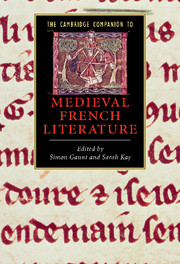Book contents
- Frontmatter
- Introduction
- Part I What is a Medieval French Text?
- Part II What is a Medieval French Author?
- Part III What is the Value of Genre for Medieval French Literature?
- Part IV How can we read Medieval French Literature Historically?
- 13 Feudalism and kingship
- 14 Clerks and laity
- 15 The marital and the sexual
- 16 Others and alterity
- Appendix: Reference works for Old and Middle French
- Bibliography of medieval French texts
- Suggested Further Reading
- Index
- Series List
15 - The marital and the sexual
from Part IV - How can we read Medieval French Literature Historically?
Published online by Cambridge University Press: 28 March 2009
- Frontmatter
- Introduction
- Part I What is a Medieval French Text?
- Part II What is a Medieval French Author?
- Part III What is the Value of Genre for Medieval French Literature?
- Part IV How can we read Medieval French Literature Historically?
- 13 Feudalism and kingship
- 14 Clerks and laity
- 15 The marital and the sexual
- 16 Others and alterity
- Appendix: Reference works for Old and Middle French
- Bibliography of medieval French texts
- Suggested Further Reading
- Index
- Series List
Summary
Though there are evident differences between medieval and modern notions of marriage and sexuality, there is really no way to contrast a set of beliefs labelled 'modern' with another called 'medieval'. Not only do the concepts themselves evolve through time within broad historical periods, but the way that they are understood can differ markedly from one community or individual to another. Most of the texts that are usually cited by historians as evidence of medieval thought are homilies and penitentials, theological treatises and records of legal proceedings, texts that shine with the lustre of authenticity and truth and may appear to be speaking in a unified voice but were often inspired by very particular concerns. They were also composed, almost exclusively, by an elite group of unmarried men whose job it was to defend church thought and local practice. The fact that much of the extant vernacular literature of the period belies and contradicts these texts indicates that even if church policy denigrated all sexual expression when divorced from reproduction, such commandments were probably not foremost in people’s minds as they went about their daily lives. I will therefore begin this chapter by looking at some of the structures within which marriage and sexuality were configured in the Middle Ages, church doctrine being one amongst them, then look at a selection of literary texts that offer typical but also surprising portraits of how that material was interpreted, undermined, twisted, and abused.
- Type
- Chapter
- Information
- The Cambridge Companion to Medieval French Literature , pp. 225 - 237Publisher: Cambridge University PressPrint publication year: 2008



